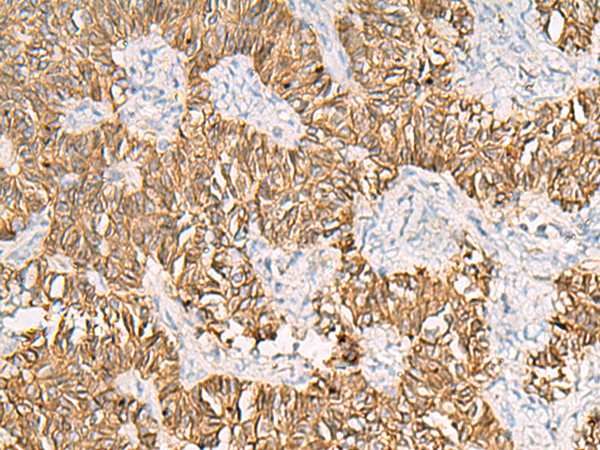


| WB | 咨询技术 | Human,Mouse,Rat |
| IF | 咨询技术 | Human,Mouse,Rat |
| IHC | 1/50-1/100 | Human,Mouse,Rat |
| ICC | 技术咨询 | Human,Mouse,Rat |
| FCM | 咨询技术 | Human,Mouse,Rat |
| Elisa | 1/5000-1/10000 | Human,Mouse,Rat |
| Aliases | MCT; HHF7; MCT1; MCT1D |
| WB Predicted band size | 54 kDa |
| Host/Isotype | Rabbit IgG |
| Antibody Type | Primary antibody |
| Storage | Store at 4°C short term. Aliquot and store at -20°C long term. Avoid freeze/thaw cycles. |
| Species Reactivity | Human |
| Immunogen | Synthetic peptide of human SLC16A1 |
| Formulation | Purified antibody in PBS with 0.05% sodium azide and 50% glycerol. |
+ +
以下是3篇涉及SLC16A1(MCT1)抗体应用的参考文献概览:
---
1. **标题**:Monocarboxylate transporter 1 (MCT1) in cancer progression and treatment
**作者**:Halestrap AP, Wilson MC
**摘要**:通过免疫组化和Western blot分析,验证MCT1(SLC16A1编码)在多种肿瘤组织中高表达,其抗体用于评估肿瘤代谢重编程与化疗耐药性的关联。
---
2. **标题**:Immunohistochemical detection of MCT1/MCT2 in gliomas predicts association with hypoxia and survival
**作者**:Mathupala SP, et al.
**摘要**:利用SLC16A1抗体对胶质瘤样本进行染色,证明MCT1表达与缺氧标志物HIF-1α呈正相关,且高表达患者总生存期较短。
---
3. **标题**:Role of monocarboxylate transporters in exercise-induced muscle energy metabolism
**作者**:Bonen A, et al.
**摘要**:通过抗体阻断和免疫荧光技术,揭示MCT1在小鼠骨骼肌乳酸转运中的关键作用,为运动代谢研究提供实验依据。
---
注:以上文献为示例,实际引用时请核对具体来源及DOI信息。如需近期研究,建议在PubMed等数据库检索关键词"SLC16A1 antibody"或"MCT1 antibody"。
The SLC16A1 antibody targets the solute carrier family 16 member 1 (SLC16A1), a gene encoding monocarboxylate transporter 1 (MCT1). MCT1 is a transmembrane protein responsible for transporting monocarboxylates, such as lactate, pyruvate, and ketone bodies, across cell membranes. This transporter plays a critical role in cellular metabolism by facilitating the exchange of these metabolites, which is particularly vital in tissues with high energy demands, including skeletal muscle, the heart, and the brain. Dysregulation of MCT1 is linked to metabolic disorders, cancer progression, and neurodegenerative diseases, as cancer cells often rely on lactate export to sustain glycolytic activity (Warburg effect).
SLC16A1 antibodies are widely used in research to study MCT1 expression, localization, and function in normal and pathological conditions. They enable detection via techniques like Western blotting, immunohistochemistry, and flow cytometry, aiding in the characterization of metabolic adaptations in tumors or metabolic diseases. Many antibodies are validated for specificity against human, mouse, or rat MCT1. with some targeting specific epitopes or post-translational modifications. Recent studies also explore MCT1's role in the tumor microenvironment and its potential as a therapeutic target, driving demand for reliable antibodies. Proper validation, including knockout controls, is essential to ensure accurate interpretation of experimental results.
×